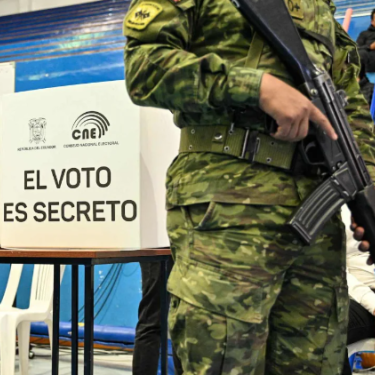Growing threat to journalists’ safety on eve of general elections in Ecuador

As Ecuador prepares to hold the first round of its general elections on 20 August amid a political crisis and a surge in organised crime that threaten journalists, Reporters Without Borders (RSF) urges the authorities to make every effort to safeguard the right to news and information and to protect media personnel.
The murder of one of the presidential candidates, the journalist Fernando Villavicencio, as he was leaving a political meeting in Quito on 9 August has drawn international attention to the scale of Ecuador’s political and institutional crisis. Organised crime’s growing strength was underscored by the death of Pedro Briones, a local political leader in Esmeraldas for Revolución Ciudadana, former President Rafael Correa’s party, in another shooting a few days later.
Journalists are among those threatened. The presence of organised crime groups allied to Mexican, Colombian and Albanian drug cartels places constant pressure on those who investigate corruption and drug trafficking, particularly in the coastal and border provinces of Esmeraldas and El Oro. Speaking on condition of anonymity, many journalists have told RSF they now censor themselves as a result of this climate.
Amid mounting political instability in recent months, journalists are also being subjected to growing hostility from the country’s politicians. Ecuadoreans have to go to the polls this weekend because President Guillermo Lasso dissolved parliament in May when it threatened to dismiss him. The Correa-backed presidential candidate who is leading in the polls, Luisa Gonzalez, attacked the press on Oromar Televisión on July 21, going so far as to describe some reporters as “pseudo-journalists,” “information traffickers” and "hit men" paid to destroy reputations.
“Political violence plays a central part in intimidation of the press. Since the start of the year, there has been a significant increase in disturbing accounts and requests for help from Ecuadorean journalists. Some want to relocate to other cities or flee abroad to escape death threats. Journalists are working in a climate of growing danger and hostility. But the institutional crisis and these elections mean that safeguards for the right to reliable news and information are needed more than ever. The authorities must undertake to do everything possible to guarantee the safety of journalists and preserve the right to information.
Investigative journalists are among the most frequent targets of intimidation. President Lasso threatened journalists with the independent news website La Posta in a speech on national TV on 14 February, calling them “entertainment mercenaries” for publishing an investigative report entitled “The Big Godfather” in January exposing alleged corruption and drug trafficking involving government officials and Lasso’s brother-in-law. Facing the camera and banging his fist on the table, he accused the journalists of attacking his and his family’s integrity, said their “15 minutes of fame” had ended, and announced that he would "fight those who want to violate freedom of expression.”
La Posta journalist Andersson Boscán and his wife Monica Velasquez fled the country at the end of July because of the scale of the threats coming from politicians and organised crime. At least four journalists and media workers have fled abroad since the start of the year because of the threats.
Ecuador is now ranked 68th out of 180 countries in RSF's 2023 World Press Freedom Index after falling 12 places in a single year. Its safety indicator suffered the biggest fall under the impact of the murders of three journalists – Mike Cabrera, Gerardo Delgado and César Vivanco
